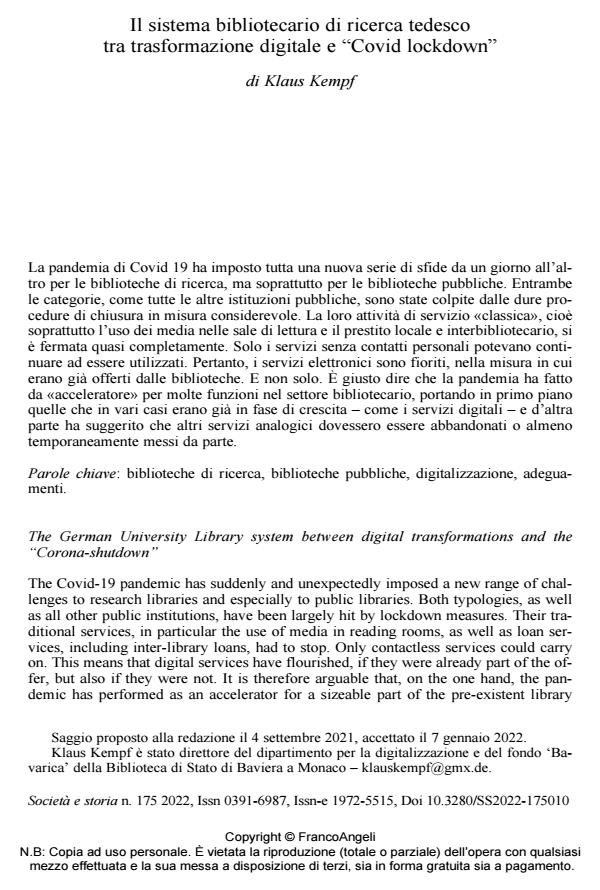Il sistema bibliotecario di ricerca tedesco tra trasformazione digitale e "Covid lockdown"
Titolo Rivista SOCIETÀ E STORIA
Autori/Curatori Klaus Kempf
Anno di pubblicazione 2022 Fascicolo 2022/175
Lingua Italiano Numero pagine 9 P. 157-165 Dimensione file 156 KB
DOI 10.3280/SS2022-175010
Il DOI è il codice a barre della proprietà intellettuale: per saperne di più
clicca qui
Qui sotto puoi vedere in anteprima la prima pagina di questo articolo.
Se questo articolo ti interessa, lo puoi acquistare (e scaricare in formato pdf) seguendo le facili indicazioni per acquistare il download credit. Acquista Download Credits per scaricare questo Articolo in formato PDF

FrancoAngeli è membro della Publishers International Linking Association, Inc (PILA), associazione indipendente e non profit per facilitare (attraverso i servizi tecnologici implementati da CrossRef.org) l’accesso degli studiosi ai contenuti digitali nelle pubblicazioni professionali e scientifiche.
La pandemia di Covid 19 ha imposto tutta una nuova serie di sfide da un giorno all’altro per le biblioteche di ricerca, ma soprattutto per le biblioteche pubbliche. Entrambe le categorie, come tutte le altre istituzioni pubbliche, sono state colpite dalle dure procedure di chiusura in misura considerevole. La loro attività di servizio «classica», cioè soprattutto l’uso dei media nelle sale di lettura e il prestito locale e interbibliotecario, si è fermata quasi completamente. Solo i servizi senza contatti personali potevano continuare ad essere utilizzati. Pertanto, i servizi elettronici sono fioriti, nella misura in cui erano già offerti dalle biblioteche. E non solo. È giusto dire che la pandemia ha fatto da «acceleratore» per molte funzioni nel settore bibliotecario, portando in primo piano quelle che in vari casi erano già in fase di crescita - come i servizi digitali - e d’altra parte ha suggerito che altri servizi analogici dovessero essere abbandonati o almeno temporaneamente messi da parte.
Parole chiave:biblioteche di ricerca, biblioteche pubbliche, digitalizzazione, adeguamenti.
- The Impact of Digitization of Libraries on the Educational Process in the Context of Distance Learning Larysa Ponomarenko, Oksana Matviichuk, Oleksandra Plytus, Olena Postelzhuk, Tetiana Pavlenko, Olena Honcharenko, in Revista de la Universidad del Zulia /2023 pp.167
DOI: 10.46925//rdluz.41.09
Klaus Kempf, Il sistema bibliotecario di ricerca tedesco tra trasformazione digitale e "Covid lockdown" in "SOCIETÀ E STORIA " 175/2022, pp 157-165, DOI: 10.3280/SS2022-175010